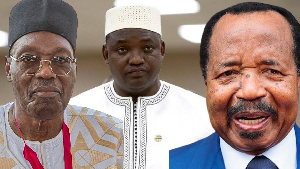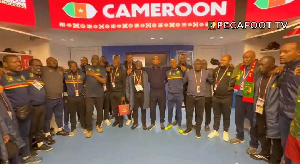Everyone knows Africa is the strategic future of the world, except the Africans, says Cheikh Tidiane Gadio, president of the Institute for Pan-African Strategies, the principal organiser of the Dakar International Forum on Peace and Security in Africa. This gathering last December — the first, but due to be held annually — brought together 400 soldiers, politicians, researchers and journalists.
It was an opportunity to analyse what an officer attached to an African military academy calls the "lack of geopolitical awareness" in Africa.
The fragility of African states and their weakness on peacekeeping and security, especially in the Sahel, is evident. African jihadist groups — mostly eradicated from Algeria, their birthplace — have spread throughout the Sahel and organised militarily, like al-Shabaab in Somalia.
The Nigerian movement Boko Haram is spilling over into Cameroon, Niger and the Central African Republic (CAR), and "points of connection" have emerged between Islamic State (IS) in the Middle East and organisations in the Sahel that previously claimed affiliation with al-Qaeda.
"They act as entrepreneurs of blind, mass violence, sometimes of the criminal economy," says Gadio, foreign minister of Senegal from 2000-09. "In many cases, their financial resources and military capability are greater than those of our own traditional defence and security forces. And they operate as networks, giving mutual support, which we cannot do."
African analysts are reviewing their thinking on security to take account of the anthropological aspects of the trend towards politico-religious radicalism.
Alioune Sall, from Senegal, executive director of the African Futures Institute, believes the priority should be the security of the people: states can no longer act alone; civil society, better placed to avert local or regional tensions, must take over. Everyone is worried about the young: the median age in Africa is 25, a time bomb.
Until now, the call for "African solutions for African problems" has often been just a slogan. The African Union (AU), though not responsible for all ills, has a record of failures. It was unsuccessful in opposing the 2011 Nato-led, United Nations-approved intervention in Libya.
THIS was launched without regard for postconflict effects and had disastrous consequences, spreading weapons and fighters across the Sahel, destabilising Mali, and eventually leading to civil war in Libya itself. The residual bitterness and mistrust are tangible, especially in Algeria, highly influential within the AU.
When jihadists tried to take over northern Mali in 2012, there were not enough African peace force soldiers, they were not ready, and differences between countries were evident. A Cameroonian researcher asks: "How many meetings of the (AU) military staff committee did it take for the African-led International Support Mission to Mali (Afisma) to be launched, only to arrive too late, in 2013, after the emergency intervention by the French army?"
The idea of African solutions to African problems is in trouble, according to the Institute for Pan-African Strategies. "The main reason it is popular in Washington, London, Paris and Berlin is that it absolves those countries of excessive responsibility," says Gadio, but Africa’s 55 countries have limited technical capabilities and "it would be naïve to believe that they share a common vision of peace".
The AU has developed an ambitious peace and security architecture, with mechanisms for conflict prevention, management and resolution. In 2004 it established a Peace and Security Council to steer policy, and a military staff committee to set up peacekeeping brigades in each of Africa’s five major regions, under the African Standby Force (ASF).
To these were added a Continental Early Warning System to analyse threats, and a council of the wise with a mission of prevention. To implement these measures, a specialised technical committee on defence, safety and security was formed.
But this impressive apparatus is still not fully operational: three road maps, in 2006, 2009 and 2011, have not made the ASF a reality. The ASF is supposed to reach full strength by the end of this year, but none of the brigades has been properly established, the logistics base in Cameroon has not been built and the problem of finance has yet to be resolved.
The delay is due to a lack of financial resources and specific competencies, and to disparities between the subregions. Nigeria, SA and Egypt — the biggest contributors to the AU budget, with the largest armies — are all unable to take on a leading role.
"The decision to put a regional organisation or the AU in charge is less the result of a clearly developed strategy than a reflection of the balance of power among the member states," says Amandine Gnanguenon of the Institute for Security Studies in Dakar.
Member states have their own reasons for not volunteering: "Preventing a conflict doesn’t do much for a politician’s visibility: it’s hard to boast of the effectiveness of preventive action if nobody is really aware of what has been prevented."
IN 2013, the delay led a dozen countries to set up the African Capacity for Immediate Response to Crises (Acirc), as an interim measure. Members — including SA, Angola, Tanzania and Senegal — finance their own participation, and must maintain their troops on the ground for at least 30 days and find partners to provide transport, logistics and intelligence.
The idea is to have an interim force capable of responding within 10 days, drawing on a reserve of 5,000. A response can be triggered by a lead state or group of states, as happens in the European Union. But the AU remains responsible for mobilising Acirc, and for its strategic management. Acirc should be operational this year: with Uganda as lead state, it could take action in South Sudan, according to Edward Katumba Wamala, head of Uganda’s defence force. Or it could take part in action against Boko Haram.
Cyrille Ndayirukiye, a Burundian general who for four years was in charge of setting up one of the peacekeeping brigades, has no illusions about the decision-making process, which is hampered by the fact that each country or institution has its own priorities.
He quotes a Ugandan proverb: "Don’t complain that the well is too deep when it’s the rope that’s too short."
Gadio says if Africa wants to make the Peace and Security Council a "UN Security Council for Africa" and not rely on the EU or other partners (notably France), "it must be prepared to foot the bill".
The UN and AU do not have the same idea of mandates for intervention and rules of engagement for peace forces. The AU, though far less active than the UN, shows flexibility by taking on peacemaking and even counterterrorism operations (such as the African Union Mission to Somalia, Amisom) as well as peacekeeping. The UN intervenes only when belligerents initiate a peace process, and uses force only in self-defence or to give tactical help, as it did last year in Democratic Republic of Congo.
The UN, AU and EU have developed partnerships. These models have advantages, but also risks, says Jean-Marie Guehenno, president of the International Crisis Group: "Is it possible for an armed intervention at subregional level to be impartial? Is there a risk the conflict will spread? If a European force has led the way, how can we be sure of a proper handover?"
Agence Global
Opinions of Monday, 23 March 2015
Auteur: Phillipe Leymarie















